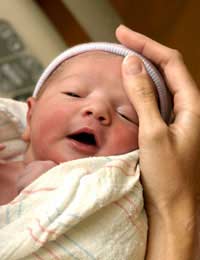Bleeding After Giving Birth

When a woman is pregnant and about to give birth, the last thing on her mind is the occurrence of bleeding after the delivery, and in fact a lot of women don’t even recognise that this happens until they experience it for themselves.
Why do Women Bleed After the Delivery?
Following the birth, the uterus must carry on working in order to return to its normal state. This means it has to shrink back from being very large to being about the size of a small fist, at the same time as shedding its inner lining which is no longer needed to protect the baby. This means bleeding occurs until the process is complete.Is it a lot?
In the first few weeks after the birth, the bleeding can appear to be quite heavy, sometimes coming in gushes whilst for others it is a trickle.Initially it is bright red and may carry some clots which lessens in colour and consistency to a yellowy colour with a sticky substance towards the end.
Can I prevent it?
Blood loss after having a baby cannot be prevented and it should be considered as a natural part of the birthing process, not something to be fearful of.Those who have had a Caesarean birth may find the bleeding takes a little longer to stop as the uterus often takes longer to return to its normal size.
How do I Manage it?
Bleeding after having a baby is all part of the birthing process and it is an occurrence that you just have to tolerate and wait until it subsides.In the first day or two after having a baby the bleeding can be quite heavy and you may be surprised at the amount of blood you are losing but don’t worry, this is a natural event and your body is designed to live without this blood.
The bleeding will subside as time goes on, for some within four weeks, for others up to six months to cease entirely. During this time you must not use tampon to control the bleeding as your cervix needs to close fully and they also increase the risk of developing an infection to quite a degree.
Buying some good quality sanitary pads is essential and make sure you buy enough to last you as you will probably have to change it more frequently than during a normal period.
Remember to pack some sanitary products in your hospital bag that you take with you when you go into labour as the hospital may not be able to issue you with the type you prefer or the amount that you will need in the first few days.
Make sure you eat a balanced diet and drink enough fluid during the days following the birth so that you don’t become dehydrated and remember to keep your hygiene needs maintained but not to overdo the scented and coloured hygiene products that may irritate you or increase the chance of infection. Natural soaps and soft towels should be sufficient to keep you feeling fresh.
Bleeding after giving birth is not something many women talk about even though every mother will understand that it does happen and is often quite unpleasant.
Your midwife will ask you about your blood loss at every visit to make sure things are progressing as they should, so please don’t be embarrassed to talk about it or express your concerns if you have any.
- Embarrassing Emotions During Pregnancy
- Postpartum Fecal Incontinence
- Leaking Breasts During and After Pregnancy
- Your Sex Life During Pregnancy
- Cloasma or Melasma: Skin Darkening During Pregnancy
- Vaginal Discharge and Odour
- Coping With Morning Sickness in Public
- Breast Feeding in Public
- What to Do If Your Waters Break in Public
- Resuming a Normal Sex Life After a Baby
- After-Pains Following Delivery
- Pregnancy Related Stretch Marks


Re: Talking to an Elderly Person About Hygiene
My mom is 95. I had a talk with her about having someone come in and do light housekeeping, wash her bed sheets…
Re: Adult Bed Wetting
I am 57 and still wet the bed most nights.
Re: Verrucas
I'm 13 in about 6 days I've had verrucas since I was 8-9, it's so embarrassing because I have to get changed in a group for PE I have one on the outside of…
Re: Hairy Toes & Feet
So funny how bigots of both signs say the opposite, that the shaved man aesthetics is influenced by gays, now some gay people say it's…
Re: Inverted Nipples
Hi im 13 and yesterday i realised i have inverted nipples but i had a surgery near my heart when i was four months old and i just want to not have…
Re: Adult Bed Wetting
i have been a bedwetter for so long now i am used to it and sleep in a single bed next to my wife
Re: Adult Bed Wetting
Hi im 52 the last 6 months ive started to.wet the bed. It can happen 2 or more times a week . I went to bed at 2am i woke up at 5am needing to…
Re: Unsightly Warts on the Face and Neck
Ihello I have face warts many years and Neck ,pls help
Re: Adult Bed Wetting
i was a bedwetter as a child until 15 due to molestation a few times growing up.. then went in hospital age 18 and wet the bed whilst staying…
Re: Inverted Nipples
Blb - Your Question:Hi I’ve recently had my baby and ever since Then I have one inverted nipple not breastfed should I be concerned?